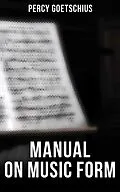Percy Goetschius' 'Manual on Music Form' is a comprehensive and scholarly work that delves into the intricate details of musical form. This book not only explores the various musical forms such as binary, ternary, and rondo, but also provides in-depth analysis and examples to help readers understand the structures of musical compositions. Written in a clear and concise style, 'Manual on Music Form' is an essential guide for musicians, music students, and anyone interested in gaining a deeper understanding of music theory. Goetschius' meticulous attention to detail and his ability to explain complex concepts in a straightforward manner make this book a valuable resource for music enthusiasts. By studying the principles outlined in this manual, readers can enhance their appreciation for the art of music and develop a more nuanced understanding of musical compositions. Overall, 'Manual on Music Form' is a must-read for anyone seeking to broaden their knowledge of music theory and form.
Zusammenfassung
This manual treats of the structural designs of musical composition, not of the styles or species of music. It undertakes the thorough explanation of each design or form, from the smallest to the largest; and such comparison as serves to demonstrate the principle of natural evolution, in the operation of which the entire system originates. This explanationbe it well understoodis conducted solely with a view to the Analysis of musical works, and is not calculated to prepare the student for the application of form in practical composition. For the exhaustive exposition of the technical apparatus, the student must be referred to my "Homophonic Forms". The aim is to enable the student to recognize and trace the mental process of the composer in executing his task; to define each factor of the structural design, and its relation to every other factor and to the whole; to determine thus the synthetic meaning of the work, and thereby to increase not only his own appreciation, interest, and enjoyment of the very real beauties of good music, but also his power to interpret, intelligently and adequately, the works that engage his attention. (Percy Goetschius, Lessons in Music Form)
